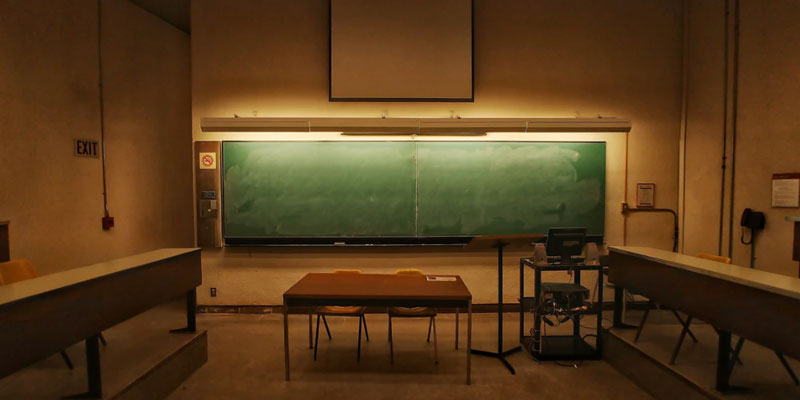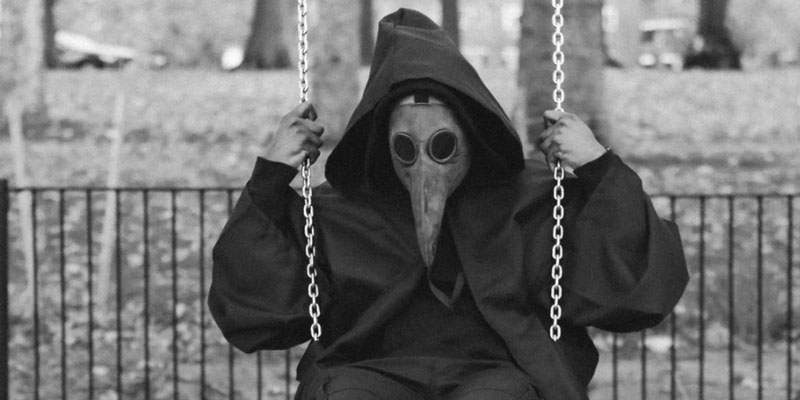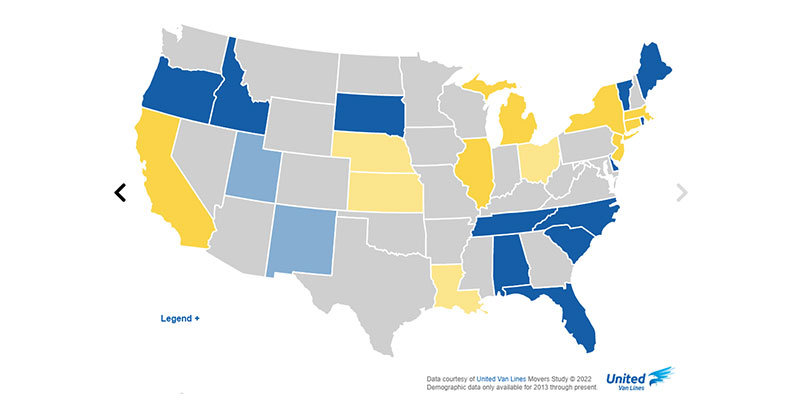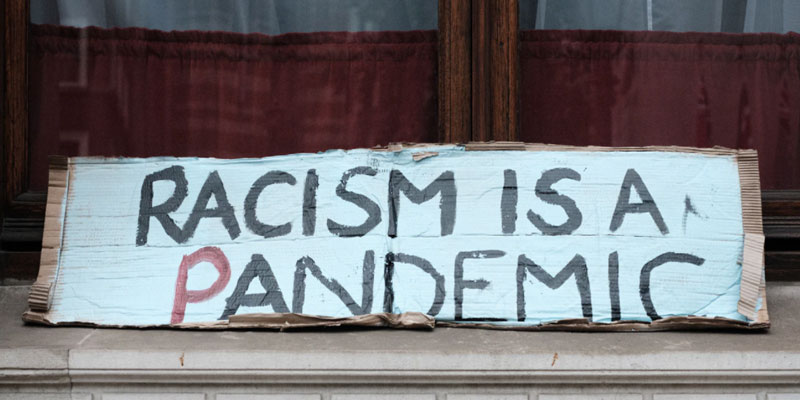John DePetro has spotted a curious requirement for a job at Hope Academy charter school in Providence, which he redubs “Woke Academy”:
They currently have a job posting (listed below) for a teachers assistant that is woke and steeped in Critical Race Theory. It starts with the ability to be aware of ” microaggressions and redirect with affirmations.” Under Qualifications and Skills, the right candidate “must acknowledge racism and privilege, and talk about racism. When you see racism or other types of inequities, you address it.” The application also talks about supervision, fire drills and other teacher assistant skills you would expect. Why should a kindergarten teacher assistant need to acknowledge racism and privilege?
This is apparently yet another area in which the practices of higher education are permeating out into our communities. As I reported in October, Roger Williams is explicitly making demonstration of woke beliefs a requirement for any sort of job, from prep cook to nude model for art students.
This is simply becoming the reality of our society. Wherever radicals can impose requirements for hiring, they will ensure that agreement with their ideology is among them.
Higher education is especially relevant in this area. A half-century ago, the classical liberals (conservatives, by today’s standards) were sympathetic to progressives’ insistence on free speech, academic freedom, and ideologically balanced hiring. Once progressives were in control, however, their characteristic authoritarianism began to emerge, complete with litmus tests for hiring and other career advancement. (For worse or [probably] better, by the way, this is why I don’t have a PhD in literature.)
Once the campus was conquered, the Left had to contend only with gradual time to inculcate their ideology into those who would go on to careers in softer, people-focused careers like human resources, messaging, and media. Meanwhile, the education establishment, including teachers’ unions, worked to fully align the institutions they controlled with the radical line.
In this way, the focus of American schools has shifted from the core mission of education to the qualifiers that Hope Academy attaches to its job description. The act of “provid[ing] individual and small group instruction” becomes subordinate to the qualification that it be done “with a socially conscious lens.”
Take particular note that Hope Academy does not consider ideological conformity merely as a nice-to-have quality in a teacher assistant. The first three “skills” in the job description are explicitly ideological. Above all, applicants must recognize the fundamentally religious mission of the school.
The ad sends this message explicitly and implicitly. After all, how important could education and accuracy actually be to a school that wants aids to assist in the “preppring” of the curriculum?
Featured image by Niamat Ullah on Unsplash.
[Open full post]When I conveyed the state Department of Health’s findings on the question of whether people were in the hospital because of COVID or merely while happening to test positive for it, one word in particular seemed worthy of a mental note for subsequent consideration (emphasis added):
According to Wendelken, “someone who goes to the hospital for another reason but is COVID-19 positive would not get admitted unless that other health issue was dire.” After “a closer clinical analysis on the charts of a subset of patients,” the DOH came to the conclusion that the virus “played a role” in the conditions of 94% of patients testing positive for COVID.
Thus far, those of us on the more-skeptical side have been agitating for authorities to recognize that COVID is entirely incidental in some hospitalizations, but we shouldn’t forget that it might be a contributing factor, without being central. Stacey Lennox picks up this thread on PJ Media:
[Open full post]An exacerbation of a chronic illness is not a Covid hospitalization. If a person with diabetes goes into diabetic ketoacidosis because of a viral infection, you treat the diabetic complication. Hospitals frequently see these complications in people with chronic conditions with influenza, pneumonia, and other acute illnesses. This phenomenon is not unique to Covid. However, it seems everyone has forgotten.
I actually just saw a Rhode Island politician proclaiming on social media that we must “never forget” January 6. The dogged fixation on that day is one of the most-obvious attempts at political narrative building in the past year.
But if we’re going to have a new national political holiday, we’re going to have to figure out some traditions. Maybe we all gather to hear proclamations of unearned moral authority and exaggerated pledges to stand against imaginary threats?
Alternately, maybe we can read things that remind us of open questions. Joseph Hanneman covers a big one for Epoch Times:
Independent media and online sleuths sounded alarms about the presence of unindicted individuals among those who first breached the Capitol at about 12:50 p.m. These men played a central role in the breach, encouraged protesters to go to the Capitol, and directed people into the building. Yet they haven’t been arrested, indicted, or identified by the FBI as among the wanted. Who were they?
As Hanneman goes on to explain, one of them was Ray Epps. Despite being perhaps the most well-documented person inciting actions above and beyond mere protest on that day, the FBI actually ham-handedly removed him from its wanted list, and he has not been arrested or charged. Weird.
I’m also keeping an eye on the progress of charges against Zachary Jordan Alam. Since I analyzed hours of video from that day, it’s amazed me that he hasn’t been the poster-boy among those emphasizing the violence. Arguably, without his participation, some of the most dramatic scenes would never have occurred and Ashli Babbitt would not have been killed, yet he’s not a very familiar face in coverage. Also weird.
[Open full post]Yesterday, I got a glimpse of how the other half perceives COVID. A Rhode Island progressive shared a tweet storm by some software guy (not a blue check) collecting every study that could be cited with ominous overtones about the supposed long-term effects of the virus.
It was the worst kind of analysis. Each of the half-dozen or so studies the guy cited would have to be carefully reviewed to understand the ways in which the methodology introduced a skew and to understand the significance of effects. A small study finding subjective assessments of feeling off six months after infection given by people who were likely to participate because they were primed to be fearful does not justify headlines making it sound as if large numbers of asymptomatic cases are showing significant brain damage.
At each stage of the information flow, another layer of analytical perspective is necessary… and rarely given. Consider this statement by Alexa Gagosz in the Boston Globe:
On Wednesday, Rhode Island reported nearly 1,200 new COVID-19 cases among the 516 schools that are holding classes in-person, compared to 50 new cases among 221 schools that are in remote learning this week.
Sounds like a scary justification for the progressive parents who are freaking out about risk to children, right? Pause and think about it. 1,200 cases in 516 schools is 2.3 cases per school — across multiple grade levels, perhaps dozens of classrooms, and probably over 100 students. Inasmuch as we’re talking about a contagious bug, the cases likely cluster, so it’s more likely that entire schools have no cases at all.
Now add in practical considerations. Students in school are more likely to be tested, particularly if somebody else in the school tested positive. Test more, find more, even if the case is completely asymptomatic. This will also put in-person schools in a worse light.
The Gagosz pivots to a national number:
And it’s not just in Rhode Island. About 672 children with COVID-19 were admitted into a hospital each day during last week, which is the highest it’s been since the start of the pandemic, according to recently released data from the Centers for Disease Control and Prevention.
That’s in a nation of over 320 million people, and the statistic is children who test positive COVID, but who might be in the hospital for any reason at all.
People who are concerned about COVID, kids, and schools are certainly not without reason, but whether they’re overly concerned is a question that takes a lot more investigation than most people have the time or experience to perform. Unfortunately, those whose job is to filter information for efficient mass consumption on either side of the question are not making reasonable conclusions any easier.
Featured image by Daniel Adesina on Unsplash.
[Open full post]For the second year running, United Van Lines’ study of its customers finds Rhode Island to be have more people moving in than moving out. In fact, percentagewise, Rhode Island was the tenth-most-inbound state. What’s going on? Has the Ocean State somehow become a population draw?
This particular data isn’t well enough defined to get into specifics, but probably not.
For one thing, Rhode Island isn’t the only state seeing an inflow, and clicking back through prior years, the trend appears to be that the inflows began when Massachusetts and Connecticut really began to see outflows. Much of it could be intraregional circulation. Put differently, it may be nothing we’re doing right, but rather things we’re not doing as badly as quickly.
Looking into the details is useful, too. Under “primary reason for moving,” jobs play a big role in the traffic on both sides of the highway, and each has one other category that is close. The difference is that, inbound, the other big reason is family, whereas, outbound, it’s retirement.
That probably explains why those leaving Rhode Island skew heavily to age ranges above 55, while those coming spread out across age ranges more evenly.
The real key to understanding, however, may come with income. In both cases, people with income above $150,000 are by far the most likely to move, but inbound families are more heavily skewed toward high income, with a much smoother curve in that direction. Outbound traffic is a little more evenly distributed toward ranges under $100,000.
However, the fact that both sides are so imbalanced toward the high end suggests that something else might be going on, here. We have to ask ourselves who uses United Van Lines? This is a big moving company with big trucks, so their customer base is probably not representative of all movers.
Indeed, for years, I’ve repeatedly found that the people leaving Rhode Island have been those without a great deal of money. Generally, when Rhode Islanders begin forming families and looking to turn their potential into income, that’s when they leave. Such people don’t need big fancy moving companies.
Indeed, looking to a related report from competing company, U-Haul, proves the point. This company, which, as its name suggests, mostly provides trucks so people can save money by packing and transporting their possessions themselves, puts Rhode Island at 32nd for net in-migration.
Put it all together, and it looks like Rhode Island might do fine attracting wealthy middle-aged people from neighboring states who move for jobs and family and may be taking the jobs and homes of the retirees who are fleeing the state, while losing younger people who are trying to build a life.
If that’s the case, it doesn’t bespeak dynamism, which indicates both a likelihood of eventual decline and an opportunity for fantastic improvement.
[Open full post]Noting that ballot harvesting is illegal in Georgia, Glenn Reynolds quotes from a Just the News story about a government investigation into a major campaign in violation of that law during the 2020 election cycle:
Georgia authorities have launched an investigation into an allegation of systematic ballot harvesting during the state’s 2020 general election and subsequent U.S. Senate runoff and may soon issue subpoenas to secure evidence, Georgia Secretary of State Brad Raffensperger confirmed to Just the News.
In case you’ve forgotten (ahem), the electoral outcomes in Georgia were absolutely central to the current makeup of the federal government, and its trillions of dollars in spending. That’s a lot of motive looking for a method of cheating.
Expect this to be ignored and downplayed, no matter what comes of the investigation. Where billionaires funded government agencies in ways that favored certain constituencies, it’s ignored because maybe it wasn’t technically against the law. Where Democrats modified laws in contradiction of constitutional requirements, it’s ignored because no courts had the courage to step in and stop it. In this case, perhaps it will be ignored on the grounds that ballot harvesting isn’t illegal anywhere, so it’s just some strange Georgian rule.
Ignore them all you want, but these things add up, and that’s why I’m entirely comfortable concluding that the results were illegitimate.
[Open full post]Honestly, I thought the matter was settled. Judging people and giving them preferential or detrimental treatment based on the color of their skin is wrong. Segregating people and providing opportunities to different groups based on race is bad.
I don’t know how it happened, but one is apt to be called a “racist” for saying such things, these days. And so:
The New York State Department of Health has issued official “Guidance” regarding rationing scarce Covid therapeutics which gives preference to non-whites over whites in proving entitlement to the therapies. All people need to demonstrate certain health problems (like testing positive) but non-whites do not need to prove that they personally have an aggravated health risk, it is presumed. Whites, on the other hand, get no such presumption.
Is race just being used as a proxy for “urban,” indicating a dense housing situation and therefore more likelihood of spreading the disease? There’d be no need for that, in an age when a check-in clerk can determine housing type as easily as a racial identity, but even that moderately less offensive excuse is not being given. Instead, the state refers to “longstanding systemic health and social inequities.” In other words, the discriminatory policy is that, in the face of a shortage of treatments, people with lighter skin should be put at greater risk of death right now because of historical inequality.
Meanwhile, Boston College and Northeastern University held a debate tournament in October that explicitly banned white students, asking registrants to fill out a “racial identification” form. Think about that. Think about how far back into history we’ve slipped that such a thing exists.
Resolved: these schools are deeply racist. Claims:
- The goal of “promot[ing] affinity among non-white… debaters” is at odds with the associated assumption that minority students require spaces in which to mingle with peers with whom they already feel more comfortable, and at least one of those considerations must contradict the additionally stated goal of “cultivat[ing] racial diversity on the league.”
- Permitting white students potentially to participate as judges, although with an explicitly “lower priority” for selection, simultaneously diminishes the value of such students by deeming them tolerable only when their participation is absolutely needed and creates the racist impression that white people can judge black people but cannot stand in competition as their peers.
- Limiting the motions to “issues relating to race and social justice” implies that minority students, appearing in debate as minority students, can only be expected to perform if the topics are restricted narrowly and ideologically.
One wonders whether any of the rounds required one team to take a position against the assumptions of identity politics. I’d wager not and expect the righteousness of the cause was an underlying truism to which all must assent while debating topics that rest upon it.
Mainstream institutions are treading on very dangerous ground, here. The key to cultural advancement and greater peace and goodwill is fair, unbiased treatment according to law and policy and cultivation of the sense that we’re all one family, one tribe. Why anybody would want to reawaken an increasingly dormant primal tendency to break into smaller factions is difficult to understand, and doing so will have repercussions that they do not foresee or want.
Of course, what do I know? A year or so ago, I wouldn’t have thought anybody would stand for the rationing of medicine based on race.
Featured image by Ehimetalor Akhere Unuabona on Unsplash.
[Open full post]Imagine living in a place where the sort of policy Paula Bolyard describes on PJ Media is actually a possibility, or even a part of the public conversation:
Arizona Gov. Doug Ducey just fired a shot across the bow of teachers’ unions and COVID-panic advocates who insist on keeping kids out of classrooms, despite the minimal risk of severe illness and death from the virus among school-age children. …
The program will fund “up to $7,000 for needs related to Arizona Department of Economic Security-approved child care, school-coordinated transportation, online tutoring and school tuition.” [Emphasis added] …
Under the innovative new program in Arizona, parents will be able to access the education funds, subject to income requirements, if a school closes for even one day.
If parents think the obvious thing to do is shut the doors of their children’s schools and go to remote learning, fine, but those who disagree shouldn’t have to be locked into a situation in which not only are their children deprived of education they’ve paid for through taxes, but they, themselves, are apt to be attacked viciously for expressing a contrary opinion.
[Open full post]Months ago, Malcolm Gladwell made a pretty convincing case on his Revisionist History podcast for dogs as allies to help us avoid the most draconian anti-pandemic measures, especially in schools.
It looks like some schools in Massachusetts got the message:
COVID sniffing K-9s have gone through all five schools in the Freetown-Lakeville district throughout the school year and now they’ll be used in Norton, according to the Bristol County Sheriff’s Office (BCSO).
Huntah, that’s Hunter with a Boston accent, and Duke are the first law enforcement K9s in the country trained to detect the scent of COVID, which is odorless to humans but has a specific scent to their trained noses.
Obviously, this could go very wrong, if having dogs sniff our children becomes an aggressively precautionary measure where it’s really not needed, but as an alternative to closing schools or even imposing masks, it would be much preferable. In short, COVID-detecting dogs would be the sort of thing we might try instead of panicking and crushing a generation of our children.
One could even imagine multiple levels of attention with the goal of ensuring that risk is tolerably low. First the dog. Then a test that determines the level of the virus, perhaps with the option of the student’s wearing a mask and staying if it’s not too high.
“Close down everything and go home” is really just a declaration that we don’t value education. Of course, Rhode Island has been proving that for decades.
[Open full post]As un-fun as it no doubt was, Patricia Morgan’s experience as a sudden Emmanuel Goldstein for progressives across the country was an opportunity to observe how the mania mob is whipped up.
At 10:02 a.m. on December 28, she tweeted the now-infamous comment about the loss of a black friend, presumably over the promulgation of critical race theory and “anti-racist” ideals. This wasn’t a wild supposition. Over a while of not seeing her in person, Morgan had observed comments her friend had been making, and then found her reception cold when next they met.
Locally, progressives pounced, calling for her resignation and removal from legislative committees. That could have been it, with the activists in Rhode Island playing their assigned roles and everybody moving on to New Years Day weekend.
By 4:32, however, Twitter had somehow served Morgan’s tweet up to Star Trek celebrity George Takei, who satirized it for his 3.2 million followers. Shortly thereafter, Boston Globe reporters Brian Amaral and Edward Fitzpatrick featured Takei’s tweet in a roundup of reactions large and small, even as content-free as, “My favorite part of this tweet is ‘a.'”
The stage had been set, and the hatefest was on.
Entering into the exchanges, I pointed out the extremity of some of the comments and noted the different response (as in none) when another legislator tweeted a facially much-more-racist comment in November. Consequently, I became a minor side target for the hate. Some of the more vitriolic statements came from people who, upon review of their Twitter profiles, turned out to be deeply unhappy, with statements about their “crippling depression,” for example.
So, we start with an innocuous, if potentially thought-provoking, comment from a minority-party state legislator in America’s smallest state, which generates to-be-expected protestations from local activists. Twitter delivers the issue to big-audience celebrities, who give mainstream journalists, both regionally and nationally, a hook for newsworthiness.
Next, the pile-on draws people with a psychological need to feel as if they are part of something — something moral, righteous, and marking them as good people for being on the right side. Then, Morgan begins receiving emails like this, from Jackson Euler:*
I read your racist, ignorant and hateful comment in the Projo and had to write to tell you what an incredibly stupid, uninformed, racist and pathetic piece of garbage you are!
I’m wishing the worst for you in 2022! Perhaps covid for you would be nice! Yes, I’ll hope for New Years that you get covid and have a fateful outcome!
Rhode Island would be a FAR BETTER PLACE if covid took you from it!
Hateful and racist POS!
Euler appears to be a lawyer from Pawtucket, and this is not the first time his email address is associated with a heated response to a woman with whose politics he disagrees.
Naturally, this is where the media’s “reporting on the controversy” will stop. Mr. Euler will get no “coming under fire” coverage. Indeed, it is only a matter of luck whether an emotionally unstable person whipped into a frenzy does something more drastic than wish for Patricia’s death, and all those who generated that atmosphere will quietly walk away.
Whether they’ll walk away with a modicum of shame or with a feeling that their mission was accomplished, only they can know, but people responding to Morgan’s hate mail clearly thought it inappropriate to fret about Euler’s escalation rather than joining in with his sentiment. That is, they thought it justified.
* Note that Euler did not confirm for Anchor Rising that the email published by Morgan was accurate, but responded to our inquiry with the message, “Go f*** yourself, traitor” (without the asterisks).
Featured image by Issy Bailey on Unsplash.
[Open full post]






